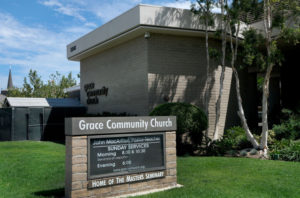
(Photo by Dean Musgrove, Los Angeles Daily News/SCNG)
Los Angeles continues to try to force Grace Community Church to cease and desist its corporate worship. Among the latest efforts to pressure the church is the cancellation of a parking lot lease that Grace has had in place with the county since 1975! As of October 1, the church is liable to have property removed from the site and will have to pay expenses incurred for such removal. On Friday, another judge heard the case and his opinion is pending in the coming days. These are but the latest struggles with the COVID restrictions and the question of whether churches are subject to the law or if a church has a duty to obey God first. Part of the question to be considered—Can we sing even if it means defying civil laws? After my first post on GCC, I was reminded by a Canadian friend that things are a bit different with our brothers north of the border. They technically do not have a Constitutional right for freedom of worship, although they have something similar in The Charter of Rights and Freedoms. I lived in the “true north strong and free” for nearly nineteen years and my entire family are both Canadians AND Americans (some by birth and some by naturalization), but the specifics of Canadian religious liberty never rose to the importance of deep reflection for me during those years. So, I asked my friend what he thought the differences were north and south. He suggested that a big difference between the countries is that Americans consider that certain rights are “inalienable,” (unalienable in the original documents)—that is rights by birth. The Declaration of Independence (1776) affirmed that people are “endowed by their Creator with certain unalienable rights,” e. g. “life, liberty, and the pursuit of happiness.” Of course, African slaves brought to the Americas were excluded from this “guarantee,” but this a discussion for another time. We have unalienable rights, while Canadians have rights granted by The Charter. What can be given, can be taken away. Americans (technically Canadians are Americans too!) think that as God grants certain rights, only He can take them away, not the government, while Canadians believe that the sovereign can grant or withdraw privileges (aka rights) at will. Americans have God-given rights while Canadians rights given by the Crown. This brings up an important historical consideration. Does the monarch, president, governor, or other civil official have the right before God to regulate Christian worship forgetting any constitutional or charter issues? In other words, is religious practice within the purview of the sovereign? Are Canadians or Brits any more obligated to obey their governments when it comes to worship than Americans who have the freedom to do otherwise? Ultimately, this is a question of religious liberty, a position long held dear by Baptists. I am not attempting to answer a Canadian question per se, but to discuss a larger issue. The debate over the Christian and his duty to obey civil leaders is a long and complex question. Our friends at Cripplegate put out a thoughtful blog considering the spectrum of Christian beliefs on civil obedience/disobedience from Romans 13. The view that I resonate with is, of course, the Baptist view—Obey when the Government promotes good or checks evil and recognize that the government should not regulate the affairs of the church. While this is called “the Baptist view” in the blog, this is really the “Religious Liberty” view. It stems not from the Baptist church as such but from the Bible—the Bible nowhere grants to civil leaders the power over the conscience. Believers from Daniel to the apostles disobeyed laws that restricted worship and hindered proclamation. The history of Baptists and religious liberty which is necessarily connected to the separation of the church and the state reaches back to the earliest days of our movement. Baptists emerged out of the Reformation, specifically English Puritanism/Separatism. Some Puritans argued for a separation from the state church—Anglicanism which replaced Roman Catholicism’s pope with the British sovereign, first Henry VIII, then Elizabeth I. Both monarchs enacted laws to compel Anglican worship. They wanted the English church separated from its Roman overlords, initially so Henry could divorce and remarry. The ostensible goal of an English church was civil stability. The king couldn’t have subjects with divided loyalties. The pope tried to force the king to heel by telling his subjects that they could disobey the laws of a rebellious king. Subjects who refused the pope would be placed under the interdict—cut off from the church. Cyprian’s dictum was extra ecclesium, nulla salus (outside the church, no salvation). If you were kicked out of the church, you were barred from heaven. On the king’s part, for his subjects to be good and loyal Anglican church members meant they were good and loyal English subjects. The Puritans hated the incomplete reformation in the English church. They hated the rules imposed on them by the sovereign. Many pastors were ejected from their pulpits for refusing to comply with forced Anglicanism, e.g. the requirement to use the Book of Common Prayer in worship. However, it took the Separatists to make the break with the Anglican Church and form non-conforming churches. These believers took things on the chin—they were hunted, imprisoned, impoverished and some executed. A group of these rebels, living in Amsterdam, came to understand that baptism (not immersion but affusion) was only for believers. John Smyth, in 1609, decided to right the wrong of infant baptism by baptizing himself (se-baptism). He soon came to think that this novel baptism was defective, so he sought another baptism from the Waterlander Mennonites nearby. His followers, whom he had subsequently baptized after his se-baptism, refused to repudiate their irregular baptism (Smyth had irregular baptism, so did they according to his thinking) and split (in good Baptist fashion) from Smyth, returning to England, to Spitafield near London, and formed the first Baptist church on English soil (1611). Thomas Helwys, the leader, penned a treatise, A Short Declaration of the Mistery of Iniquity (1612), a copy of which he sent to the sovereign, King James. On the front free end page of the king’s copy, now preserved in the British Library, Helwys wrote, “The king is a mortall man, not God therefore hath no power over ye immortall soules of his subjects, to make lawes and ordinances for them, and to set spiritual Lords over them.” For his efforts, Helwys was arrested and imprisoned at Newgate, dying there around 1616. Admittedly, the circumstances of Helwys’s resistance to the king and GCC’s resistance are different, or are they? Both argued for religious liberty on a biblical basis. While the US Constitution also addresses this, isn’t the Bible sufficient to decide these matters? Just how much authority (or tyranny) are Christians required to endure? Consider the California church that has racked up enormous fines for refusing to shut its doors. In China today, president-for-life Xi Jinping’s program of sinicization is removing crosses and portraits of Jesus in churches and replacing them with portraits of the president. At the same time, efforts are underway to replace the Chinese Bible with a better, more China-friendly version. Chinese Christians cannot organize churches and appoint their own pastors, a least not openly. The house church movement has flourished in China because, despite a basic lack of freedom for religion in China, they continue to meet and follow biblical teaching in defiance of civil authority. Should Chinese Christians submit to their government? Why is their situation different than ours? I respect my Canadian friends who think they must obey the law at all costs, even if this means no singing in the assembled services, unless the service is held outside. But I am not persuaded that GCC is sinning by doing the opposite. I warned my Canadian friend that this “pandemic” could be a “camel’s nose in the tent.” Just how much regulation will we tolerate from our governments? Henry VIII and his successors argued that a state church meant civil stability. The dissenting churches were destabilizing things by disobeying the “law.” Is GCC doing any different? I haven’t answered the question about singing. I have argued a larger governing issue—religious liberty. The answer to the singing question seems simple. Is singing a necessary part of worship? If you think it is, how then can you rightly worship as a church without it? What if this violates the law? As a Baptist, I would answer that the king needs to keep out of the church, the pandemic notwithstanding. I am not arguing that Christians should be cavalier. But neither can Christians simply disregard biblical duties. If singing is a part of worship and worship is to be regular, then so must singing. O Lord, grant us wisdom to understand, grace to persevere and love for others in these difficult days.

0 Comments